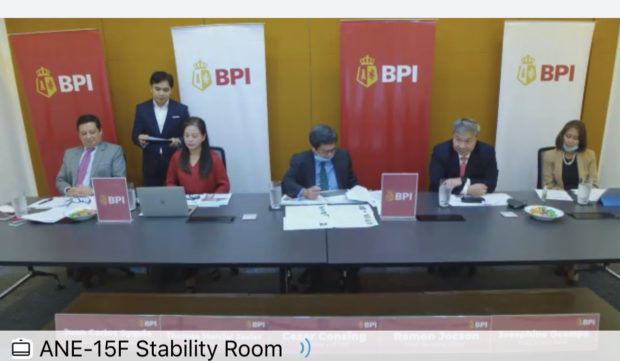Banks prepare for surge in loan defaults

BPI’s press briefing on April 23, 2020 in virtual format
With the Philippines at risk of going into an economic recession due to the COVID-19 pandemic, local bankers hope to prepare for a possible string of corporate loan defaults by having an enabling law for the unloading of bad assets using the special purpose vehicle (SPV) mode.
In the aftermath of the 1997 Asian currency crisis, Philippine banks took the SPV route to take out bad assets. Unlike some other Asian countries when governments bailed out big banks, local lenders saddled with foreclosed assets cleaned up their balance sheet on their own, but with a lot of help from fiscal incentives provided by the Special Purpose Vehicle (SPV) Act of 2002.
“If we look back 10 to 20 years, that will be very relevant,” said Bank of the Philippine Islands president Cezar Consing, when asked whether SPVs would be applicable at this time that credit losses were likely to mount due to the COVID-19 pandemic and the consequent lockdown of Luzon and other key regions.
Consing, who is also president of the Bankers Association of the Philippines, said in a virtual press briefing after BPI’s stockholders’ meeting last week that there were now lawmakers—particularly those under the House committee on banks and financial intermediaries led by Quirino Rep. Junie Cua—“looking at SPVs very, very carefully” and working with the Bangko Sentral ng Pilipinas.
“Obviously, we can all hope that we don’t have to use it but it’s better to be ready,” Consing said.
Article continues after this advertisementAsked whether the country might need a similar SPV enabling law, the president of another big local bank said: “If we are to assess based on gut feel, the answer is yes. However, if the infections are contained and the lockdown is relaxed, the [return to] business as usual can be faster and there may be no need.”But the banker feared that the country might end up needing the SPV enabling law to address what could be a new wave of bank loan defaults. “I hope I’m wrong,” the banker said.
The last time the Philippines saw an economic recession was in 1998 when the Asian financial crisis—characterized by massive local currency devaluation against the dollar, the collapse of property markets and a wave of corporate bankruptcies that bludgeoned banking systems—resulted in a 0.6-percent GDP contraction. INQ